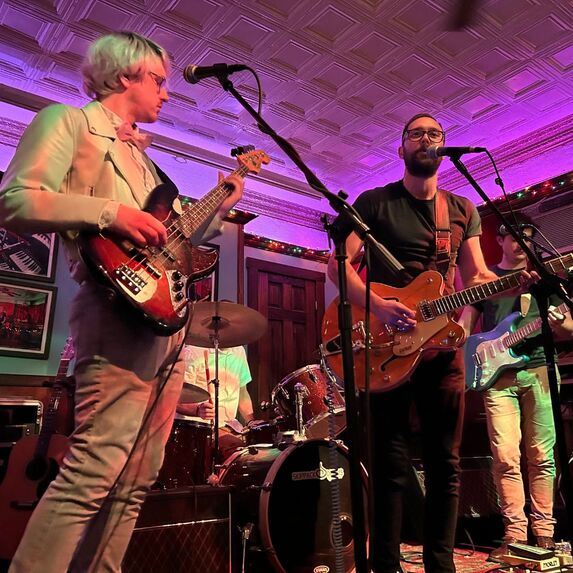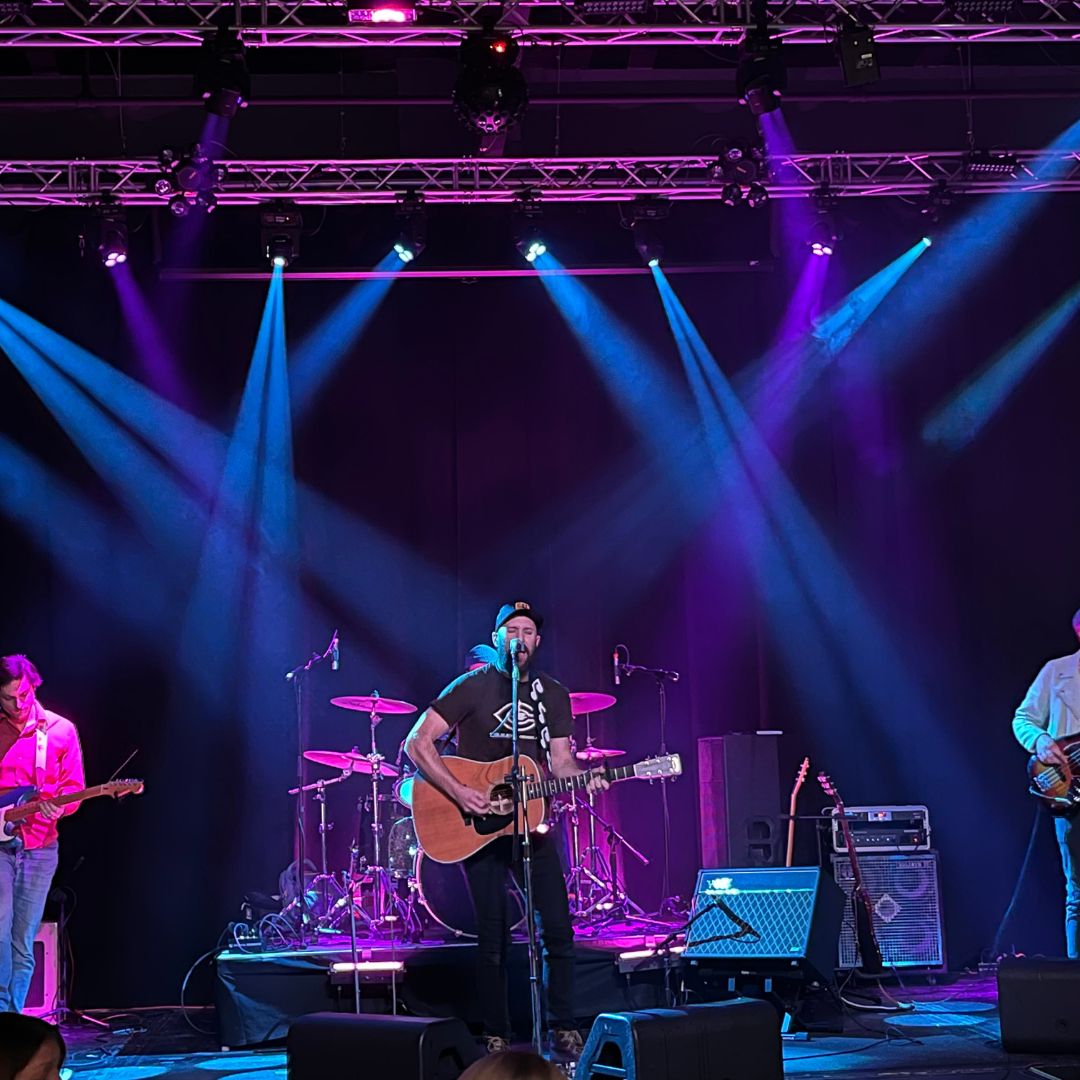
Mansion on the Hill Interview
Q: Can you talk about your musical history?
A: It’s funny, Ed and I had been writing songs separately for ourselves for years, but Mansion on the Hill didn’t materialize until COVID struck. I had been working on my own musical projects as a past-time during the dreadful malaise of 2020 quarantine, and little did I know that Ed would call me up and ask me to listen to his tunes and lay some bass lines down. He even asked me to help produce some of the tracks in their raw demo stages. It was then in working with Ed that I discovered the raw power of these tunes; his unabashed voice, his sincere guitar strums, and his masterful lyricism coalesced into something greater than the sum of its elements. When he asked me if I wanted to help him start a band (a life-long dream of mine after being a self-produced one man creative up to that point), it was a no-brainer. Carl and Ryan came along in 2022 and helped define, refine, and elevate our sonic fingerprint, taking our craft to the next level.
Q: What are some of the topics and themes you explore on your album Eye Hustling?
A: Considering eight of the ten tracks on the record were penned by Eddie, the majority of the songs on the record are reflections of his worldview and stories he’s conjured as a byproduct of that. As far as my song, “Bluest Skyes,” I wrote and recorded it solo years ago, but brought it to the band as I was proud of it and felt it would be even better with their contributions. It was a song I wrote to impress someone I was romantically interested in at the time, and it’s standard lovey-dovey fare. I wanted to write a song that felt like the stage where you become truly cozy with someone, and you’re content just existing together. There are lots of tongue-in-cheek references and inside jokes in there, but the vibe is universal.
Q: How do you approach songwriting as a band?
A: It’s evolved so much from the first record to where we are now. Initially, Ed would bring his acoustic guitar and notebooks, and while strumming and humming through, each of us would begin to embellish and envelop the tune with our own flavors and feels. Usually Ed and I would start together, and once I’d build a bass line, our drummer, Ryan, would groove his skins off of me, and then Carl would lay his signature astral guitar textures overtop. Very organic process built around feeling, but the impetus was always Ed’s book of hymnals. Most recently, other members of the band have brought songs into the fold, and while there are pretty solid ideas at root, we’ve gotten more comfortable with allowing the songs to morph and evolve as we fumble through them together. The best parts we come up with are whatever feels right for each member and their role in the song, in service to the song. We have brand new tracks for Album #3 that came from seedlings of more improvisational energies, and allowing the songs to find us rather than the other way around.
Q: Can you talk about your musical history?
A: It’s funny, Ed and I had been writing songs separately for ourselves for years, but Mansion on the Hill didn’t materialize until COVID struck. I had been working on my own musical projects as a past-time during the dreadful malaise of 2020 quarantine, and little did I know that Ed would call me up and ask me to listen to his tunes and lay some bass lines down. He even asked me to help produce some of the tracks in their raw demo stages. It was then in working with Ed that I discovered the raw power of these tunes; his unabashed voice, his sincere guitar strums, and his masterful lyricism coalesced into something greater than the sum of its elements. When he asked me if I wanted to help him start a band (a life-long dream of mine after being a self-produced one man creative up to that point), it was a no-brainer. Carl and Ryan came along in 2022 and helped define, refine, and elevate our sonic fingerprint, taking our craft to the next level.
Q: What are some of the topics and themes you explore on your album Eye Hustling?
A: Considering eight of the ten tracks on the record were penned by Eddie, the majority of the songs on the record are reflections of his worldview and stories he’s conjured as a byproduct of that. As far as my song, “Bluest Skyes,” I wrote and recorded it solo years ago, but brought it to the band as I was proud of it and felt it would be even better with their contributions. It was a song I wrote to impress someone I was romantically interested in at the time, and it’s standard lovey-dovey fare. I wanted to write a song that felt like the stage where you become truly cozy with someone, and you’re content just existing together. There are lots of tongue-in-cheek references and inside jokes in there, but the vibe is universal.
Q: How do you approach songwriting as a band?
A: It’s evolved so much from the first record to where we are now. Initially, Ed would bring his acoustic guitar and notebooks, and while strumming and humming through, each of us would begin to embellish and envelop the tune with our own flavors and feels. Usually Ed and I would start together, and once I’d build a bass line, our drummer, Ryan, would groove his skins off of me, and then Carl would lay his signature astral guitar textures overtop. Very organic process built around feeling, but the impetus was always Ed’s book of hymnals. Most recently, other members of the band have brought songs into the fold, and while there are pretty solid ideas at root, we’ve gotten more comfortable with allowing the songs to morph and evolve as we fumble through them together. The best parts we come up with are whatever feels right for each member and their role in the song, in service to the song. We have brand new tracks for Album #3 that came from seedlings of more improvisational energies, and allowing the songs to find us rather than the other way around.
Q: Have you played this music live and if so how does it translate with an audience?
A: Our most recent show at Dawson Street Pub was wild. We’re still up and coming and finding our fanbase, and we’re always pleasantly surprised at how kinetic these tunes are and how they lend themselves well to the dance floor. We’re very committed to playing originals because we believe in the strength of our own tunes, and rarely play covers, so when our own songs get people out on the floor and grooving, without inhibition, it’s quite a trip. For me the most important thing music can do is translate to others as resonant feeling, so whenever people are moving and shaking to songs they’ve never heard before, we know we’ve done something right. Music is the almighty activator.
A: Our most recent show at Dawson Street Pub was wild. We’re still up and coming and finding our fanbase, and we’re always pleasantly surprised at how kinetic these tunes are and how they lend themselves well to the dance floor. We’re very committed to playing originals because we believe in the strength of our own tunes, and rarely play covers, so when our own songs get people out on the floor and grooving, without inhibition, it’s quite a trip. For me the most important thing music can do is translate to others as resonant feeling, so whenever people are moving and shaking to songs they’ve never heard before, we know we’ve done something right. Music is the almighty activator.

